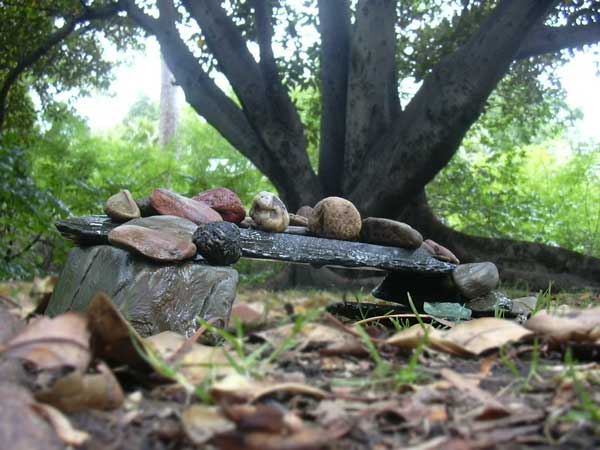The Nov-Dec 2005 ecofaith series
|
This page summarises the six week series of worship and contemplation which lead to the continuing ecofaith worshipping community. First you will see the basic structure we used, then the input for each week. We advertised the initial series as: What we did could easily be repeated elsewhere. Contact Jason if you would like to. Summary of what we did for our six week program in 2005This is roughly what we did worship wise each week, in the Botanic Gardens for three weeks, then Botanic Park (our current home). Call to worshipThe Aboriginal nations lived here with the Creator for tens of thousands of years before Abraham was even born. Opening prayerGod of 70,000, million million million stars and countless planets. You are welcome here. We pray for a sense of your presence here amongst us, and an openness to what you have to say to us this morning. Meditation“God is love, (hands at sternum, reach up, around, down and back in a heart shape) Welcome-Aboriginal Calendar- we are between Wullutti and Woltatti- a time when animals are breeding, grass trees flowering, The Southeaster winds and sea breezes beginning to give way to the Northerlies, and there is plenty of fish and meat. “Intercession”God hear our prayers, and speak to us of the A reading of some kindFive-ish minute “input” (compiled below)A moment of silence, pondering or listening to the sounds around usMeditation 2Wander off around garden for ten minutes, collect one collectible (leaf, fallen flower, stick, rock) which strikes your eye to bring back to the group. Go around circleKids first if there are any and they want to, they may need more prompting. More prayerAnother minute of silent prayer for the group, now we know a tiny bit more about each other. Sending outA God who is unseen, unheard, untouched, unsmelt and untasted is no God to us. Go in peace as part of life, into the loving presence of the God of life- beyond us, one with us, amongst and within us. InputFor more depth you could read the thesis on which they are based from the Flinders University Library.
“context for the next six weeks”- the story of lifeStars in Universe vs Straddie Psalm 8- the writer saw about 2000 stars evolution storyif 1cm = all of H. sapiens existence 18 cm the genus Homo Human spirituality about 1mm # of human species30-50,000 years ago Homosapiens, neanderthalensis, floresiensis and possibly erectus So we have a new, very different creation story... Different from Genesis (Jews, Christians, Moslems) For eg Genesis- three big claims: Humans alone are the image of God (actually men alone) So over the next few weeks we will explore: The Image of God, dominion, Fall. Salvation, wholeness (McGod and McLife), Jesus. Life as the image of God
CRITIQUE IMAGE OF GOD- NOT JUST HUMANS, BUT ALL OF LIFE (DON’T GO INTO WHAT THE NEW IMAGE LOOKS LIKE), PLUS THE BIT ON DOMINION (ALL OF LIFE) AND PRE-EMPT NEXT WEEKS DISCUSSION OF THE FALL. Creation stories- every culture has one: the Jews had 2 that we know of (Genesis 2-3 and then later Genesis 1). All make theological claims. Genesis makes three important ones (as xns interpret it): humans alone are created in the image of God, are given dominion over the rest of life, and are responsible for the Fall of creation. Today: the Image of God. Who is the image of God? Who is like God? If you want to see God, who do you look to? Who has a special role as God’s representative? Genesis 2 (Adam and Eve) gives special place to humans- we are the ones who receive the breath of God. Adam and then Eve have a special relationship and role with God, and the other animals a somewhat of a backdrop. This is made much more explicit and much more abrupt in Genesis 1, written some centuries later: "And God said, Let us make man in our image, after our likeness: and let them have dominion over the fish of the sea, and over the birds of the air, and over the cattle, and over all the earth, and over every creeping thing that creeps upon the earth. So God created man in his own image, in the image of God he created him; male and female he created them. And God blessed them, and said to them, Be fruitful, and multiply, and replenish the earth, and subdue it: and have dominion over the fish of the sea, and over the birds of the air, and over every living thing that moves upon the earth. " (NRSV, but with the "thems" returned to "hims") The image of God. It says something about what its bearer is like, and the kind of role they have. If you have the image of God and someone else doesn’t, you are more like God than them, a better example of God, and you have a special role on Earth amongst those without the image. Do we have any basis, apart from these ancient creation myths, for claiming to be in the image of God, and therefore for having a unique role on Earth? Many Christians today accept that Genesis is not historically accurate, and most don’t think it was ever meant to be. But they usually simply accept its theological accuracy. It isn’t that straightforward. The theology does, to some extent, rely on the historical story. What implications would a new creation story, like the cosmological and evolutionary one I very briefly outlined last week, say to us about something called the image of God? About our place on Earth? Really briefly: The science story of life has for a very long time now confronted us with the fact that every ability which humans possess, every characteristic, is found to some extent in other animals. There is a continuum of life, not a sharp ontological break. We are genetically related to every other organism which has ever existed- And we are not the end of the story, life on Earth will continue for hundreds of millions of years. We are far from being the end point or pinnacle of life, if there is such a thing. We are part of the story of life, but not the centre of it, or even the culmination of it.\ Part of this gathering is an invitation to a journey where we continue to expand our appreciation of the image of God, of the magnitude and mystery of God. The image of God was once limited to the emporer. Genesis expanded it to include all men. Most of the church, and probably synagogue, has expanded it to include all humans. We need to continue that trend to comprehend all of life as the image of God. For in God all things live and move and have their being, not just humans, so God is found- seen- in all things. It is not a matter of looking at individuals and deciding which of us has more of the image of God, has a more special role, but of looking at Life. Life in its whole evolutionary history and current ecological diversity. It makes sense: Life is the image of the God of life. This life which has for billions of years not been human, and even now is overwhelmingly not human! It is a sign of maturity to be able to accept that everyone in the family is equally unique, important and loved. That’s what gives the family strength- a communion of equals. Life is the image of the God of life. So if we start to listen to the creation stories of the cosmologists and evolutionists, and are willing to question the theology in Genesis 1 and Genesis 2-3 we seem to be knocked down a peg or two! We lose our special status. We lose our special role, our dominion. We have to give up being the only child- but who wants to do that? Who would see this as anything but bad news, the antithesis of Christianity? Well, those who have learned to play with and love and enjoy the company of their siblings. Sometimes the only child is the lonely child, and if our parent has enough love to go around (and surely God does), then there is much good news for younger children, and even middle kids! AND WAIT- there’s more! Not only do you get lots of brothers and sisters to play with, and find relief from burden of being in charge, if we’re not the centre of the story of God and life then everything isn’t our fault! Genesis 2-3 assumes that pain and death are the fault of Adam and Eve, of us- humans. But if life existed for billions of years before humans arrived, then pain and death didn’t arrive with us. Everything isn’t our fault! It is not that human activity created death, pain, disease and despair, but that the process of life, which brought about the evolution of humans, intrinsically include death and pain. The life of some causes the dis-ease of others. The Christian story of the Fall has it exactly backwards, exactly wrong, which is good news indeed! Good news which we will explore next week. For now, to summarise: Other kids were here first, more will come, and our parent loves us all. Everyone plays their part in the ever evolving family of God. Everyone shares in dominion, everyone is special, but nobody is irreplaceable, even humans. Life is the image of God. Jesus’ desire was that we have life in all its abundance, appreciate life, live life, play our part in the image of God and open our eyes to the image of God all around us. So when we leave, let’s remember to spend some time with our family- our whole family, because it is in and through them that we shall see God!
If time (which there wont be I'm sure): the Stream of life image: Rivers have channels, their progression is somewhat constrained and guided, yet they carve their own channels. You can never tell just where a river is going to flow next. Every part of the river is connected, as is the DNA of all creatures. Streams dry up, representing extinctions. They merge together, as when free living bacteria became the mitochondria which now provide energy to our cells. The river, however, needs to be three dimensional. If we take a slice through the stream at any point in its evolutionary history, we would have a web of life. Our stream is kind of like veins in a leg, pulsing with life. A three dimensional, inconceivably complicated, unpredictable flow of life. I invite you now to tyr to grasp this in your mind by closing your eyes: You are standing in a vacuum. All is dark. Suddenly, on the horizon, you can see something. Something tumultuous, tumbling, flowing, pulsing, expanding and contracting. It is flowing straight towards you. A twisting, three dimensional stream, a network of trillions of channels, flowing through history towards you. It takes three billion years to reach you, yet it seems to happen in an instant. Sometimes it nearly dries out, then it bursts forth in new patterns. It starts as a rumbling at the horizon, rushing forwards until it is about to bowl you over, carving out millions of billions of trillions of channels as it comes. It hits you, flowing and tumbling all around you. Then it is past. Now you need to look over your shoulder. Watch as this incredible powerhouse races off into the distance. Not far behind you the links which represent H. sapiens either dry up, or split off in new directions. Soon the channels representing complex plants, mammals, birds, lizards, amphibians, dry up. But the raging torrent of insects and microbes continues on to the far horizon, sometimes full, sometimes nearly empty. Finally, the insects are gone. Eventually, as the sun envelops Earth the microbes are gone too. We have just seen the best snapshot of the whole of life I can imagine. We have seen something of the image of God. 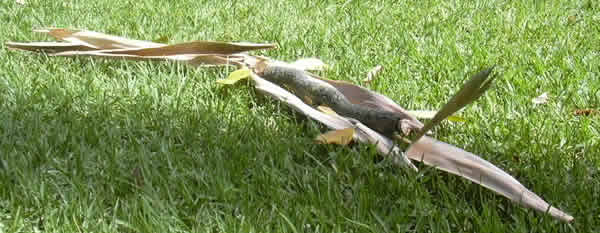 crocodile sculpture by Isaac Dominion
Maybe we only thought we were meeting outside a building created by and for humans. This is very much a human creation, for humans. So what subtle messages is the garden sending us about dominion? If we look closer, though, there are also subtle signs what challenge human dominion. Look more closely the garden beds. It doesn’t take long to see signs of our dominion being constantly usurped and challenged Humans can’t make any of this happen. We can remove what don’t want to grow, and plant things, but we cant make them grow. Our dominion, even here, is very limited. Imagine this piece of land. Now what do we make of human dominion? Duly humbled, we might turn to Genesis 2- the call to serve and protect (till and keep) rather than control and dominate. Ge 2:15 The LORD God took the man and put him in the garden of Eden to serve it and protect it. We usually translate it Till and Keep, because we assume, as did the authors at the time it was turned into words probably, that serving and protecting is farming. But further back in history, amongst the wanderers who told it over and over again, it may have had its original, broad meaning of serve and protect. So here is the first conundrum, for those of us who want to continue to live our faith in line with the theology, if not the literal history, of Genesis. And there is a real advantage in keeping to the theology of Genesis, even if we have to pick between two contradictory theologies. And on the small scale, of time and space, it can even seem possible. If we focus on 2005-2020 rather than 3b BC to 3b AD, and perhaps on our own back yard, or a strip of degraded vegetation near us, we can dominate th bit of land, or we can serve and protect it But- if we cannot actually ever hope to exercise dominion, and if the rest of life doesn’t actually need to be served or protected, is that really a useful thing to commit ones-self to? Is it a healthy view to have of one’s self- the centre of everything? If we alone are the image of God, then we must accept that we alone carry some sort of burden for the rest of life. If we see all of life as the image of God, then we must conclude that all of life exercises dominion over life. If we are part of the image, then we have part of the dominion. A role but not the role. But what is that role? We’ll get to that in about two weeks I hope. Or it might be the last week. The Fall- or notI’ve been suggesting that the ancient age of the universe, and the Earth, and the evolutionary connection between all creatures means that we are not the centre of the story of the relationship between God and life. We seem to be knocked down a peg or two! On the other hand, we are not at fault. All the pain, death, suffering, all the cyclones and mudslides and volcanoes are not our fault, nor our ancestors fault. Genesis 2-3 tells a story in which pain and death are the fault of Adam and Eve, of us- humans. But if life existed for billions of years before humans arrived, then pain and death didn’t arrive with us. Everything isn’t our fault! the “Genesis story”
and especially its common xn interpretation, is backwards So we reject, or I do, any kind of historical interpretation of a Fall. This is hardly new, the Jewish people don’t have a doctrine of the Fall even though they share the same stories, and xns throughout history have spoken out against what became the dominant interpretation. BUT If God is good (other religions just decided that God/s wasn’t good), why do we experience so much “bad”? Pain, death, suffering. Women screaming and even dying in childbirth, people’s muscles aching as they grow food to survive? Ge 2-3 was an explanation for all of this. It became the foundation for the doctrine of the Fall, pulled together by Augustine, but not without dissenters. But now we have a better explanation. Foundation removed. No need to keep reinterpreting a doctrine just to sound orthodox There is no “Fall” The common xn story that through one man death entered the world is wrong. So is the part where the creation was subject to futility (or cursed) because of us. Wesley and so many other Christian
writers were wrong. Painful childbirth is not a punishment- bipedalism and intelligence (brain size). Weeds in field- our farming practices- they were moving from nomadic to agricultural lifestyles This is good- if it is not punishment, we can work to change it. Look for good birth positions etc. Look for better farming practices. So one conclusion- pain and death (disease etc etc) and the suffering they cause are an intrinsic part of life. We could not have life without them. We would never have evolved without them. So if we are good, they are good. But what is, for example, the implication of saying that death is good, not as a means of escaping the world and getting to heaven, but just good? And that only works for some things. We may leave behind the idea of a Fall, we may affirm death and pain as necessary and even good, but what about the really bad stuff. Is there still some kind of “original sin”? Not as a one off historical event involving Adam and Eve, but something inherently sinful, corrupt and violent about us? Next week- Original Sin, Depravity
and all that good stuff! 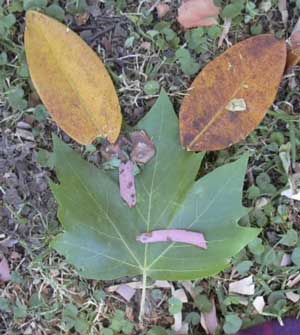 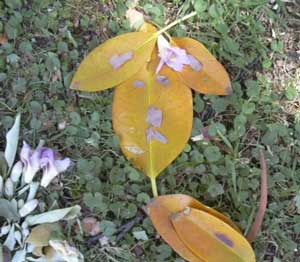 nature sculptures by Billie (nearly eight) and Isobel Goodwin (ten Original Sin?Largely based on Mary Clark- In Search of Human Nature Is there original sin even if Ge 2- has it wrong, and the Christians who drew out of it a doctrine of the Fall have it wrong? Are we inherently corrupt or violent? People have thought so- but then they have been, mostly, studying humans living in industrial societies- so all they have really proved is that in industrial, high density societies, violence is common. They may have proved, not that we are inherently violent, but that nuclear family, industrial style living is inherently dysfunctional. Me and Toni with kids.
Mary Clark- we are not inherently
violent, but have inherent needs NOT inherently evil or corrupt,
Wesley was wrong but if we can’t make meaning of the tension between bondedness and autonomy, or we have too little of either, we get dysfunctional. (depressed, violent…) • For 99% of
our evolution these basic needs were: We are not fallen, but our environment is changing FAST and isolating us from an awareness of the rest of Life. So we are not utterly depraved, but we are often dysfunctional. That is, we have trouble functioning in our new environment. Creation is not fallen but
evolving. Ditto for us. But the Christian countercurrent to the bad news of the fall has always been the good news of divine rescue. The second Adam who saves us from the curse of the first Adam. Jesus who saves us. If the first Adam never did what the biblical Adam is said to have done, if we reject the theology around the first Adam- what do we make of the second Adam?
Next week, I wont have an input
session, we will all be doing the input on this question!
Who then is Jesus?
What kind of Messiah does this product of evolution, which we call Homo sapiens, need?
|
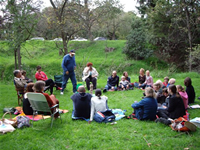 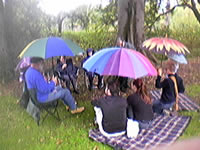  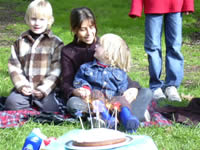 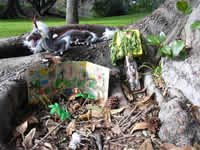 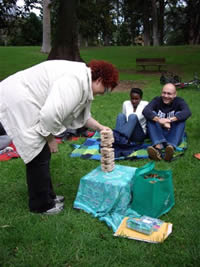 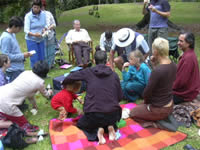 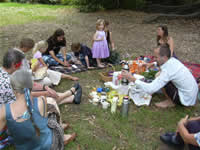 |
| Disclaimer |
